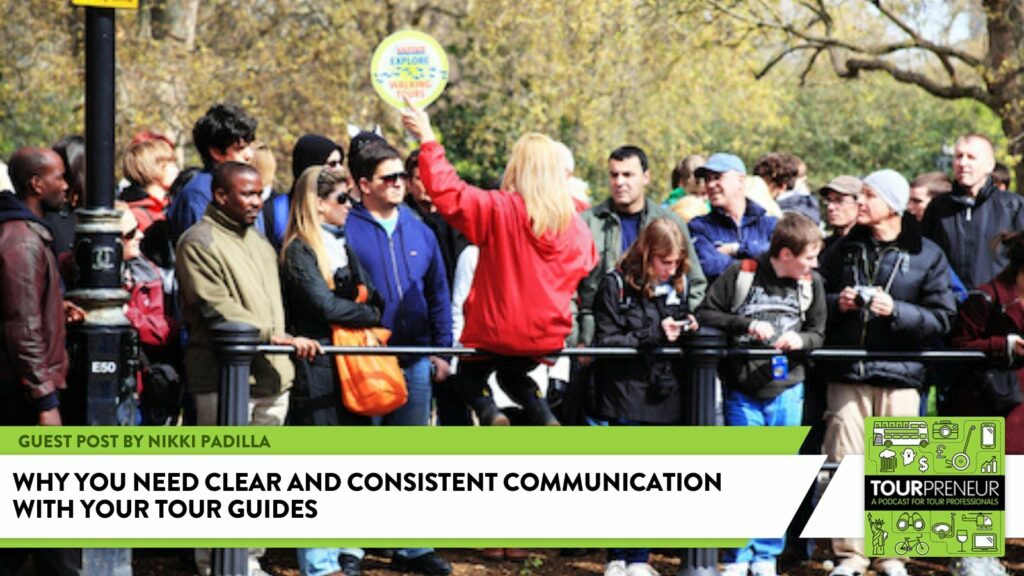There tends to be a fear amongst tour operators that guides will learn all of their tricks, steal them, and become a competitor (and of course this fear comes from some instances of truth). However, I would argue that, by pulling back the curtain to show your guides what really goes into your company, they will see that it is impossible to copy or take on themselves.

It’s to your benefit that your tour guides understand what is going on with your business.
There tends to be a fear amongst tour operators that guides will learn all of their tricks, steal them, and become a competitor (and of course this fear comes from some instances of truth). However, I would argue that, by pulling back the curtain to show your guides what really goes into your company, they will see that it is impossible to copy or take on themselves.
Communicating and being transparent with your guides will gain their trust, their understanding, and will encourage them to commit themselves to you (provided that you’re showing how much effort you’re putting in to bring them more work).
More importantly, what you don’t divulge to your guides, they will assume. For better, or for worse.
Now during a Global Pandemic, it’s even more imperative to keep your guides in the loop, let them see your struggles, and lead them with just the right balance of vulnerability and confident leadership. Think this has been stressful for you? Imagine it for them, the same stop of work, the same uncertainties about the future, and yet with even less control than you have to do something about it. Guides need to feel seen and considered. Communicating regularly is the first step.

As a leader, it’s your job to be as transparent as you can, while still protecting your team in bad times by showing them you have both confidence and a plan (perhaps, several plans).
Some things that are useful for guides to know;
- when business is good (especially if you trace it back to them & their efforts, it’s a pat on the back)
- when business is bad- and why, e.g. a normal dip in the off-season, or a loss of distribution partner (it will give guides more empathy to understand why they aren’t getting a raise, or why you don’t want to talk about their new tour idea right now, it can also remotivate them to do what they can to help, like being more active about getting reviews)
- how you schedule your guides (what criteria do you use to choose who gets first pick on tours, how do you ensure that criteria is fair and unbiased)
- upcoming campaigns or partnerships (the demographics of guests can change depending on what partner they’re coming from, or if they booked via a discount, it’s useful information for guides to be able to anticipate and prepare- especially if guests have any booking questions on the ground)
Prioritize creating a Psychological Safe Space.
In their book, No Hard Feelings, the Secret Power of Embracing Emotions at Work (highly recommend), the authors define ‘psychological safety’ as “a place [teams] felt they could suggest ideas, admit mistakes, and take risks without being embarrassed by the group.”
The book cites studies that shows team members with a Psychological Safe Space at work were; “less likely to leave their jobs, brought in more revenue, and were rated effective twice as often by executives”. You can take a quick quiz to evaluate your team’s psychological safety on the book’s website here.
Emotional empathy isn’t just for HR purposes, it also greatly affects your bottom line.
Some things you can do to help create that Safe Space and encourage your guides to be open and honest with you;
- regular one-on-ones
- consistent communication (whether that’s an internal newsletter once a month or a quarterly in-person meeting)
Being understood
The biggest mistake I see managers make is to communicate for communication’s sake, without any effort to make sure the communication is received.
If you’re not taking the time to make sure your team understands a message, it is a complete waste of your time.
Things to keep in mind;
- your lense (e.g. you are an entrepreneur, your guides might not be, so they might not have the same elation at the prospect of ‘we just need to push through & in 5 years we’ll be successful’!)**
- English competency (if you operate globally and have guides who speak English as a second language, don’t assume that, because they give tours in English, they can understand an email full of specific business terms, or that they can understand you speaking quickly as a native speaker, especially if you have a strong accent (e.g. Southern American, or British), make an effort to keep communications concise, free of slang, and, when possible, offer a subtitled video version of any major update)
- the medium/platform (where are your guides most comfortable/most likely to check updates, is it social media (maybe a FB group) or Slack, or email…make it easy for them to keep up to date with your communications, not harder)
**other lenses to be aware of; cultural, gender, age, etc. A great read is Subtle Acts of Exclusion by Tiffany Jana, which draws attention to exclusionary actions you might not realize you are taking.

